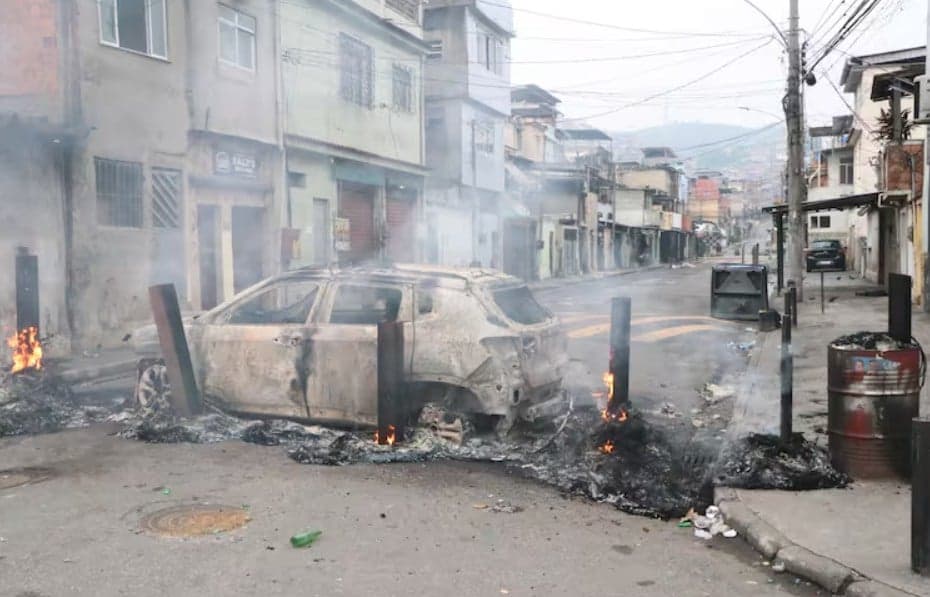The Penha favela awoke in grief and shock. Following the largest police operation in Rio de Janeiro's history against the Comando Vermelho (CV) drug gang, which left at least 132 dead according to the latest official count, residents spent the early morning moving dozens of bodies to a local square to try to identify them.
According to the newspaper O Globo, 60 bodies were brought by residents from the Vacaria area, in the Serra da Misericórdia, where the most intense clashes between security forces and drug traffickers took place. At 3:00 a.m., a long line of pickup trucks began unloading the bodies in São Lucas Square, in the heart of Penha, north of Rio. There, men and women organized themselves to place the bodies on the pavement, covered with plastic or cloth, in a desperate attempt to identify their relatives.
The images released by local media are harrowing: dozens of bodies lined up, some in their underwear, while neighbors silently watched. Many people approached to lift the blankets and examine the faces of the deceased. “How could he destroy so many families, so many lives, and get away with it?” lamented a woman as she stroked the face of her dead son. Another mother cried out, “Where is my son?” as neighbors comforted her. Authorities have not yet confirmed whether the recovered bodies are part of the official tally of 116 alleged criminals killed, as reported by the state government after the operation. According to witnesses, there may still be bodies at the top of the hill, where the clashes were most violent.
The Secretary of the Rio Military Police, Marcelo de Menezes Nogueira, told the G1 news portal that an investigation will be opened to determine the circumstances under which the bodies were moved by residents and to verify if they all belong to people linked to the Comando Vermelho. The operation began on Tuesday and involved some 2,500 police officers and soldiers, helicopters, armored vehicles, and drones. The action directly targeted the structure of the Comando Vermelho, Brazil's oldest and most powerful criminal group, with a presence in Bolivia and links to Colombian drug trafficking organizations.
During the raid, security forces arrested 81 suspects, confiscated 93 rifles and more than half a ton of drugs, according to the Rio government. However, the scale of the confrontation was such that four police officers were killed and dozens were wounded. Scenes of gunfire and smoke filling the skies over the favelas of the Penha and Alemão Complex circulated on social media and news broadcasts worldwide.
Governor Claudio Castro described the operation as “the largest in Rio’s history” and assured that the alleged criminals “were neutralized.” “We will not allow organized crime to control our city,” he stated in a message posted on the X network (formerly Twitter).
Criticism for human rights violations
Despite the official narrative, human rights organizations questioned the lack of transparency and the level of violence employed. “We will demand explanations regarding the circumstances of this action, which once again turned the favelas into a scene of war and barbarity,” denounced Deputy Dani Monteiro, president of the Human Rights Commission of the Rio de Janeiro Legislative Assembly.
Images of neighbors transporting bodies in vans fueled criticism of the methods used by security forces and reignited the debate about police lethality in Brazil, one of the countries with the highest number of deaths in operations worldwide.
Brazil's Supreme Court imposed restrictions on police operations in the favelas in 2020, limiting the use of helicopters and prohibiting actions in areas near schools or hospitals. However, those measures were lifted this year, allowing the return of large-scale operations in densely populated neighborhoods.
According to official figures, more than 700 people died in police operations in Rio during 2024, an average of almost two per day. Tuesday, with more than 100 deaths, could become the bloodiest day in the city's recent history.
Meanwhile, in São Lucas Square, the scene remains desolate. Amid the silence and weeping, residents continue trying to identify their dead. “I’ve never seen anything like it,” said one resident. “We don’t even know how many are still missing.”
SOURCE: La Nación.

